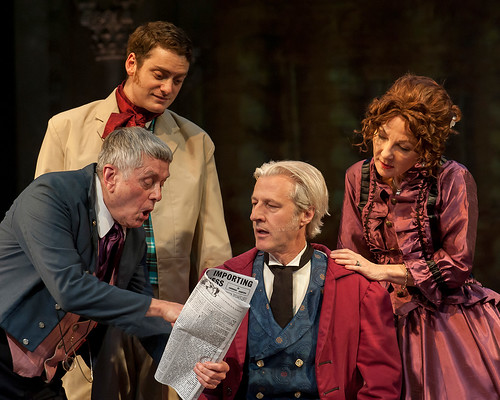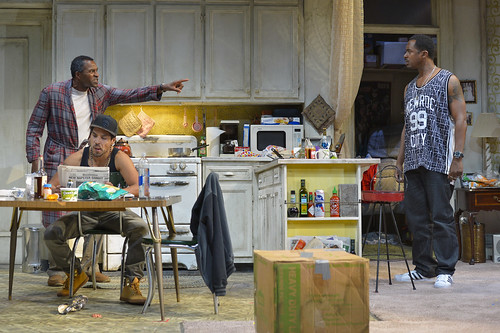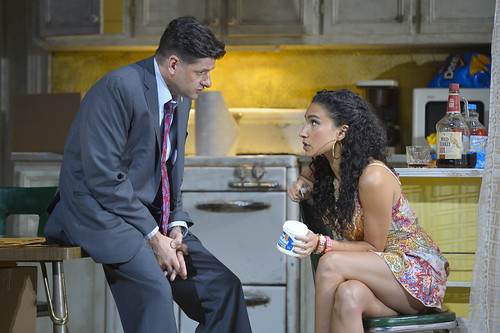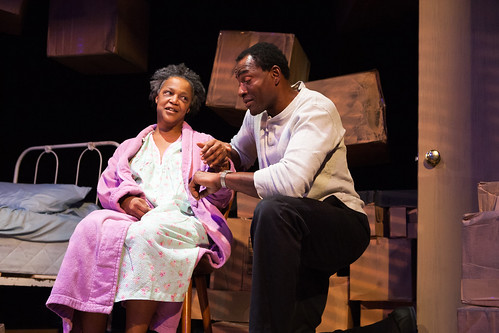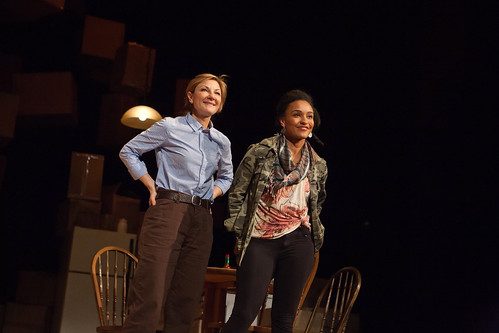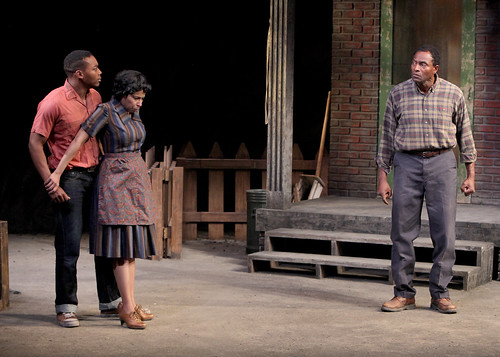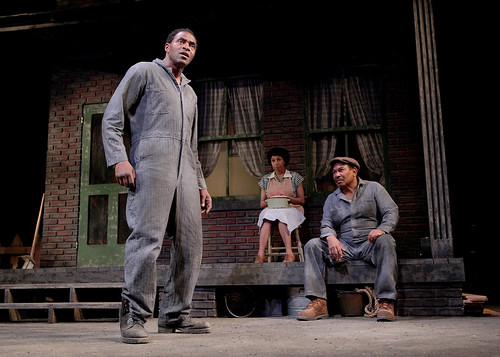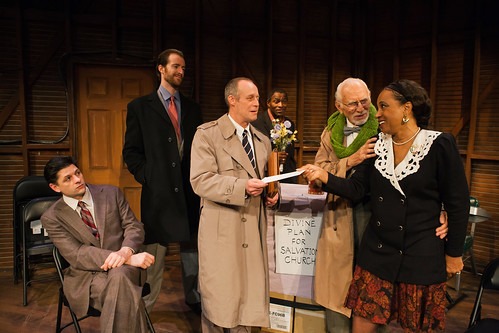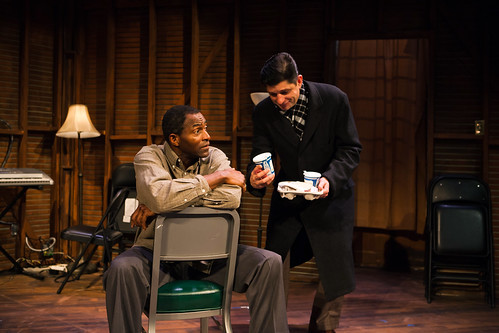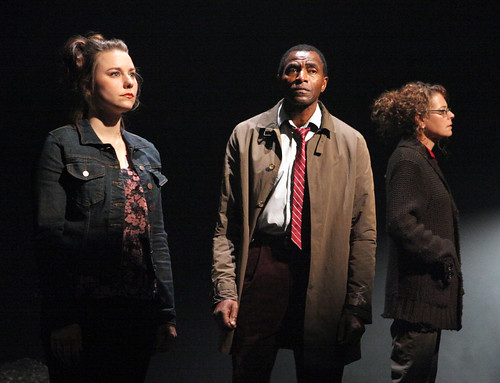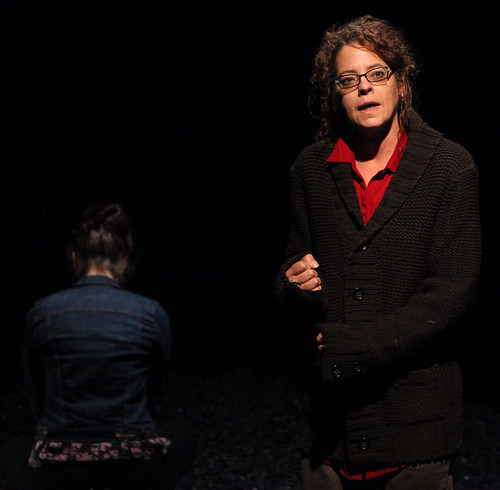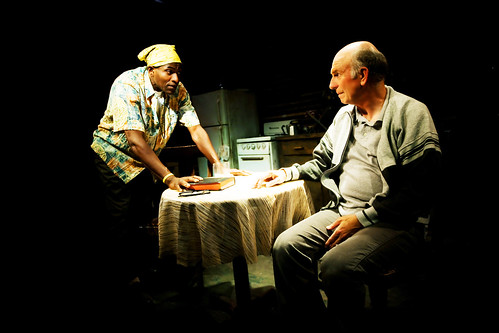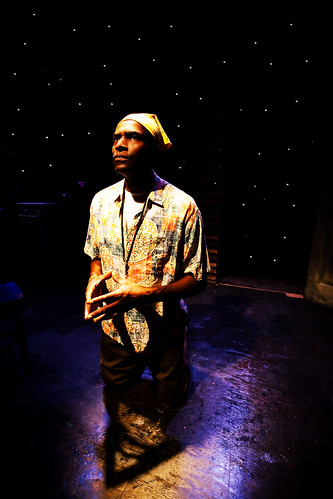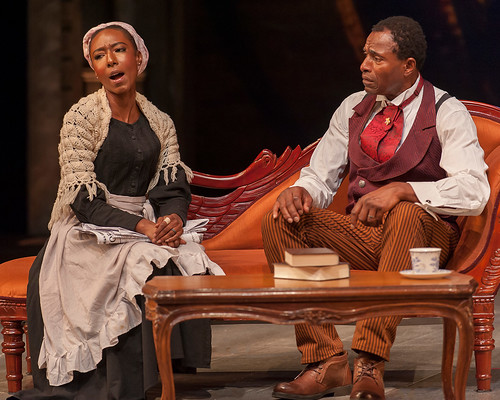
Ira Aldridge (Carl Lumbly, right) discusses his opening-night performance with a servant, Connie (Britney Frazier), after becoming the first black actor to play Othello on a British stage in Lolita Chakrabarti’s Red Velvet at San Francisco Playhouse. Below: Company members at Covent Garden (from left, Richard Louis James, Devin O’Brien, Tim Kniffin and Susi Damilano) react to the reviews of their production of Othello. Photos by Ken Levin
Lolita Chakrabarti’s Red Velvet opens an intriguing window on an age-old issue that shows no signs of diminishing. The racism that Chakrabarti writes about is specific to a time and place – London in 1833, a year after the massacre of more than 500 slaves and public outcry led to the Slavery Abolition Act was passed – but feels like it could be happening here and now. How sad and dispiriting that is.
A first-time playwright when Red Velvet debuted in 2012 at London’s Tricycle Theatre, Chakrabarti takes a significant but little-known moment in history when American actor Ira Aldridge becomes the first black man to perform on the British stage. Stepping in for an ailing Edmund Kean, Aldridge played the title role in Othello, and if you think the Brits were any more enlightened on the subject of racial equality than their American counterparts, this drama, an affecting confluence of history and theater, will disprove that notion.
In its West Coast premiere production at San Francisco Playhouse, Red Velvet provides a plum starring role for the great Carl Lumbly, who tackles the role of Aldridge with depth and gravity. This is a serious actor playing a serious actor whose concern is more for getting the role right than playing into the bile being spewed in his general direction for daring to be a black man playing a black man in the ultra-white world of the theater. From the beginning, when we meet a weary Aldridge 34 years later when he’s playing King Lear on tour in Poland, Lumbly is captivating. The gimmick of Aldridge having to deal with a nosy Polish journalist is a pretty weak way to launch into the story of his controversial British stage debut, but this 1867 sequence turns out to be a powerful bookend for the show.
The bulk of the play is taken up with Aldridge taking on the Moor thanks to the enterprising producer – Patrick Russell as Pierre LaPorte – of the Theatre Royal in Covent Garden. LaPorte doesn’t exactly prepare his cast well for Aldridge’s arrival, so their reactions to him are varied. Leading lady Ellen Tree (Susi Damilano), who will be Aldridge’s Desdemona, turns out to be more excited and open-minded than her co-stars, one of whom, Charles Kean (Tim Kniffin), son of the great Edmund, refuses to step on stage with Aldridge. There are rants and diatribes about the dangers of letting people of color on the stage – what will be next, actual half-wits playing Caliban? – using much the same logic that was trotted out when women were finally allowed to perform.
It’s ugly, but the actors, including Devin O’Brien as Henry Forester, Elena Wright as Betty Lovell and Richard Louis James as Bernard Wade, make the best of it. The resulting performance, of which we see an enticing snippet, seems thrilling. Ellen can’t wait to discuss it afterward with Aldridge and do some rehearsal to make the following night’s performance even better. She’s completely taken with Aldridge’s more method way of performing, as opposed to the “teapot” acting of her fellow Brits, where they pose and intone, one hand on hip and the other arm up. She’s a real actor energized by something new and substantial. For her, it stops being about race and starts being about craft. Damilano’s performance captures all of this beautifully, and when Ellen is hustled off the stage by Charles, her fiancée, it’s a real shame we don’t get to see or hear from her again, especially when her name is used to further sully Aldridge’s reputation.
The press eviscerates Aldridge and the theater company for having the audacity to hire him, and even his friend and defender LaPorte turns on him. The only other black person in the room is maid Connie (Britney Frazier) who is also made at him, but not because he’s black but because she doesn’t like the murderous way Othello behaves.
Director Margo Hall’s production is firing on multiple, powerful cylinders for much of the show’s nearly 2 1/2 hours. There’s a certain repetition to the points Chakrabarti is making, but Hall powers through with a strong cast and superb physical production that features a gorgeous theater set (and immersive, non-distracting projections on the back wall) by Gary English, rich lighting by Kurt Landisman and lustrous costumes by Abra Berman. All the period details are there, but the vitriol and stupidity is entirely of the moment. Evolution, it seems, takes even longer than we thought.
FOR MORE INFORMATION
Lolita Chakrabarti’s Red Velvet continues through June 25 at San Francisco Playhouse, 450 Post St., San Francisco. Tickets are $20-$120. Call 415-677-9596 or visit www.sfplayhouse.org.

